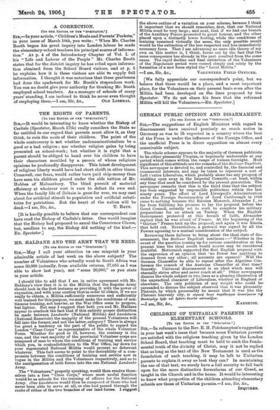MR. HALDANE AND THE ARMY THAT WE NEED. [To THY
EDITOR OF THE " SPECTATOR."]
SIR,—May I call your attention to one misprint in your • admirable article of last week on the above subject? The number of Volunteers who actually went to South Africa was some 30,000 (actually, from available returns, 37,685 as I was able to show last year), not " some 20,000," as you state in your article.
I should like to add that I am in entire agreement with Mr. Haldane's view that it is to the Militia that the Regular Army should look in the first instance as providing it with the power of expansion, and with your cantiOnthat in order Wobtain, if we are really to obtain, a Militia sufficiently numerous and sufficiently well trained for this purpose, we must make the conditions of con- tinuous training, not heavier, as the War Office seem to propose, but lighter. But may I suggest that both you and Mr. Haldane appear to overlook the fact that if this entirely proper distinction be made between Landwehr (National Militia) and Landsturm (National Reservoir) the majqpity of the present Volunteers will fall into the former, and not the latter, category? There is always too great a tendency on the part of the public to regard the London "Class Corps" as representative of the whole Volunteer Force. Whether for good or ill, however, the contrary is the case, and the vast majority of the provincial Volunteer corps are composed of men to whom the conditions of training and service which you, in contradistinction to thb War Office, lay down for your regenerated National Militia would present no deterrent whatever. This fact seems to point to the desirability of a com- promise between the conditions of training and service now in vogue in the Militia and the Volunteers respectively, and so to the amalgamation of both forces into the one National Landwehr Army.
The " Volunteers," properly speaking, would then resolve them- selves into a free "Class Corps," whose most useful function would' be as schools for the training of officers for the National Army. ,Our Landsturrn would then be composed of those who had never been able to servo at all, or else had passed through the ranks of either of the two brapches of our land forces. I suggest the above outline of a variation on your scheme, because I think it important that we should remember, first, that our National Militia must be very large ; and next, that if we had one branch of the Auxiliary Forces promoted to great honour, and the other placed upon a distinctly lower footing, while the' conditions of training remained virtually the same, the only possible result would be the extinction of the less respected and less immediately necessary force. That I am advancing no mere idle theory of my own on this matter is, I think, borne out by the fact that the same consequence has already in the past resulted from the same cause. The rapid decline and final extinction of the Volunteers of the Napoleonic period were caused simply and solely by the formation of a new force styled the " Local Militia."
—I am, Sir, &c., VOLUNTEER FIELD OFFICER.
[We fully appreciate our correspondent's point, but we believe that there would be a place, and a most important place, for the Volunteers on their present basis even after the Militia had been developed on the lines proposed by the Spectator. We do not share his fears that the reformed Militia will kill the Volunteers.—ED. Spectator.]










































 Previous page
Previous page